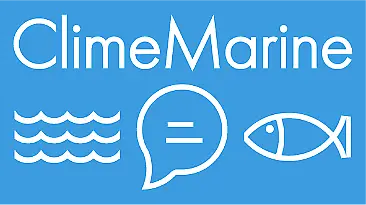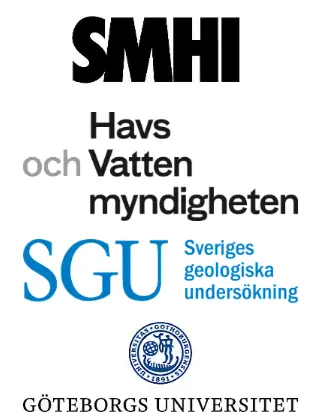ClimeMarine – Climate change predictions for Marine Spatial Planning
The ClimeMarine project promotes ecosystem-based management of the Swedish seas with climate change considerations through close contact with stakeholders and decision-makers. The project is funded by Formas.

Global warming is well underway and climate change will induce alterations and effects on the marine environment for decades or centuries to come. The goal of ClimeMarine is to take a first step towards climate-proofing ecosystem-based management of Swedish seas. This is done by considering the implication of climate change scenarios and associated data uncertainties when developing guidelines for ecosystem-based climate adaptation and Marine Spatial Planning. Through a continuous dialogue and co-creation of research questions, the project investigates opportunities and hindrances for different sectors’ ability to comprehend and integrate climate-change into their decision-making process.
Watch Video provided by: Swedish Agency for Marine and Water Management (youtube) External link.
External link.
Within ClimeMarine, the cumulative impact assessment tool Symphony, developed and used by the Swedish Agency for Marine and Water management for Marine Spatial Planning, will be further developed by incorporating the latest climate model data. We hold regular user fora with our stakeholders, where we will promote knowledge-sharing and creativity regarding the application of climate model information for climate adaptation. In addition, the project will investigate how information from Symphony can be utilised in the Swedish national Marine Spatial Planning and associated decision-making processes. Results from the project and the stakeholder dialogue will be available through various national and international conferences, seminars, and workshops, e.g. Almedalsveckan and Havs- och Vattenforum. Results will also be available to the Swedish audience via the web.
Project partners
In the ClimeMarine project, the Swedish Meteorological and Hydrological Institute (SMHI), Swedish Agency for Marine and Water Management (SwAM), Geological Survey of Sweden (SGU), and University of Gothenburg (GU) work together to interpret climate scenarios to create new information and knowledge that can be used to improve the Swedish Marine Spatial Plans. The project will also identify new research priorities through stakeholder discussions and will identify gaps in the knowledge needed to climate-proof marine plans in Sweden.
Swedish Meteorological and Hydrological Institute – SMHI
SMHI develops knowledge and data of the marine environment, both from observations and models. With the help of models, SMHI also simulate how the marine environment might change during the 21th century, based on the latest radiative forcing (RCP) used by the UN International Panel on Climate Change. SMHI leads and coordinates the project and is responsible for delivering climate data and assist with the development of Symphony. In addition, SMHI supports with expertise in climate, physical, and biogeochemical processes in the sea.
Swedish Agency for Marine and Water Management – SwAM
In Sweden, SwAM is responsible for marine management and marine spatial planning. SwAM has, together with experts, national authorities, and universities, developed the cumulative impact assessment tool Symphony, which is used in this project. SwAM is responsible for the performance and development of Symphony, as well as implementing the project results into Swedish Marine Spatial Planning.
Geological Survey of Sweden – SGU
SGU aim to increase knowledge about the state of the environment in the seabed and benthic sediments. SGUs marine environment and planning unit provide geodata and geo-analytical support services to SwAM in support of the national Marine Spatial Planning process in Sweden. They undertake regular geological field research and are national data hosts for geological and geochemical information. These data are interpreted for use in marine planning and for planning/identification of marine protected areas. SGU provide geodata and metadata (including quality and uncertainty estimates) for their own data and also assist with gathering, interpretation and analysis of 3rd party data for implementation and development of SwAM’s Symphony tool.
University of Gothenburg – GU
GU has broad research about the marine environment and ecosystems. This includes connectivity in the seascape, how to design marine protected areas, and how marine species and their habitat might change with the ongoing climate change. GU will contribute with databases and expertise about current and future connectivity- and habitat changes as well as theory about how to design marine protected areas and combine this with tools for Marine Spatial Planning.
About the project
Funding
ClimeMarine is funded by the Swedish Research Council, Formas, within the framework of the National Research Programme for Climate (grant no. 2017-01949) during 2018-2020.
Contact persons
For more information about the project, please contact:
Project partners and funders
Oceanographic research at SMHI External link.
External link.
Swedish Agency for Marine and Water Management External link.
External link.
Geological Survey of Sweden (SGU) External link.
External link.
University of Gothenburg, Department of Marine Sciences External link.
External link.
Symphony – a tool for ecosystem-based marine spatial planning External link.
External link.
Formas: Nationella forskningsprogrammet om klimat External link.
External link.
.webp)
Reports and Peer-Reviewed Scientific Articles
Brévière, E. et al. (2023) Why we must think about climate change when planning how to use our seas. Front. Young Minds. 11:1029011.
kids.frontiersin.org/articles/10.3389/frym.2023.1029011 External link.
External link.
Järnberg, L. et al. (2023) Strategic agency and learning in sustainability initiatives driving transformation: the symphony tool for ecosystem-based marine spatial planning. Sustain Sci 18, 1149–1161.
doi.org/10.1007/s11625-022-01286-w External link.
External link.
Meier, M.H.E. et al. (2023) Multidecadal climate variability dominated past trends in the water balance of the Baltic Sea watershed. npj Clim Atmos Sci 6, 58.
doi.org/10.1038/s41612-023-00380-9 External link.
External link.
Wåhlström, I. et al. (2022), Projected climate change impact on a coastal sea—As significant as all current pressures combined, Global Change Biology, 28 (17): 5310-5319
doi.org/10.1111/gcb.16312 External link.
External link.
Meier, H. E. M. et al. (2022), Oceanographic regional climate projections for the Baltic Sea until 2100, Earth Syst. Dynam., 13, 159–199
doi: 10.5194/esd-13-159-2022 External link.
External link.
Jahnke M, Jonsson PR. (2022), Biophysical models of dispersal contribute to seascape genetic analyses. Phil. Trans. R. Soc. B 377: 20210024.
doi: 10.1098/rstb.2021.0024 External link.
External link.
Gröger, M. et al. (2022) Atmospheric rivers in CMIP5 climate ensembles downscaled with a high-resolution regional climate model, Earth Syst. Dynam., 13, 613–631
doi.org/10.5194/esd-13-613-2022 External link.
External link.
Krapf K et al. (2022) Investigating Hypoxic and Euxinic Area Changes Based on Various Datasets From the Baltic Sea. Front. Mar. Sci. 9:823476
doi: 10.3389/fmars.2022.823476 External link.
External link.
Meier H. E. M. et al. (2022), Climate change in the Baltic Sea region: a summary, Earth Syst. Dynam., 13, 457–593
esd.copernicus.org/articles/13/457/2022/ External link.
External link.
Jahnke M and Jonsson PR. (2022), Biophysical models of dispersal contribute to seascape genetic analyses. Phil. Trans. R. Soc. B 377: 20210024.
doi.org/10.1098/rstb.2021.0024 External link.
External link.
Meier H. E. M. et al. (2022), Oceanographic regional climate projections for the Baltic Sea until 2100, Earth Syst. Dynam., 13, 159–199
doi.org/10.5194/esd-13-159-2022 External link.
External link.
Almroth-Rosell E, et. al., (2021) A Regime Shift Toward a More Anoxic Environment in a Eutrophic Sea in Northern Europe. Front. Mar. Sci. 8:799936.
doi.org/10.3389/fmars.2021.799936 External link.
External link.
Dutheil, C., et al., Understanding past and future sea surface temperature trends in the Baltic Sea. Clim Dyn (2021).
doi.org/10.1007/s00382-021-06084-1 External link.
External link.
Gröger, M., et. al.: Coupled regional Earth system modeling in the Baltic Sea region, Earth Syst. Dynam., 12, 939–973, https://doi.org/10.5194/esd-12-939-2021, 2021.
doi.org/10.5194/esd-12-939-2021 External link.
External link.
Jonsson P.R., et. al., Combining seascape connectivity with cumulative impact assessment in support of ecosystem-based marine spatial planning. J Appl Ecol. 2021;.58:.576–586.
dx.doi.org/10.1111/1365-2664.13813 External link.
External link.
Markus Meier, H.E., et. al. Natural variability is a large source of uncertainty in future projections of hypoxia in the Baltic Sea. Commun Earth Environ 2, 50 (2021).
doi.org/10.1038/s43247-021-00115-9 External link.
External link.
Gröger, M., et. al. Is interactive air sea coupling relevant for simulating the future climate of Europe?. Clim Dyn (2020).
doi.org/10.1007/s00382-020-05489-8 External link.
External link.
Linus Hammar et. al., Cumulative impact assessment for ecosystem-based marine spatial planning, Science of The Total Environment, Volume 734, 2020, 139024, ISSN 0048-9697
doi.org/10.1016/j.scitotenv.2020.139024 External link.
External link.
Wåhlström, I., et. al. (2020), Combined climate change and nutrient load impacts on future habitats and eutrophication indicators in a eutrophic coastal sea. Limnol Oceanogr.
doi.org/10.1002/lno.11446 External link.
External link.
Wåhlström, I., et. al. SMHI Report Oceanography No. 68 (2020)
Jonsson PR, et. al. Ecological coherence of Marine Protected Areas: New tools applied to the Baltic Sea network. Aquatic Conserv: Mar Freshw Ecosyst. 2020; 1–8.
doi.org/10.1002/aqc.3286 External link.
External link.
Meier, H.E.M., et al. Future projections of record-breaking sea surface temperature and cyanobacteria bloom events in the Baltic Sea. Ambio 48, 1362–1376 (2019).
doi.org/10.1007/s13280-019-01235-5 External link.
External link.
Gröger, M., et. al. Summer hydrographic changes in the Baltic Sea, Kattegat and Skagerrak projected in an ensemble of climate scenarios downscaled with a coupled regional ocean–sea ice–atmosphere model. Clim Dyn 53, 5945–5966 (2019). https://doi.org/10.1007/s00382-019-04908-9
doi.org/10.1007/s00382-019-04908-9 External link.
External link.
Dieterich, C., et. al., Extreme sea levels in the Baltic Sea under climate change scenarios - Part 1: Model validation and sensitivit., Ocean Sci., 15, 1399–1418, 2019. https://doi.org/10.5194/os-15-1399-2019

